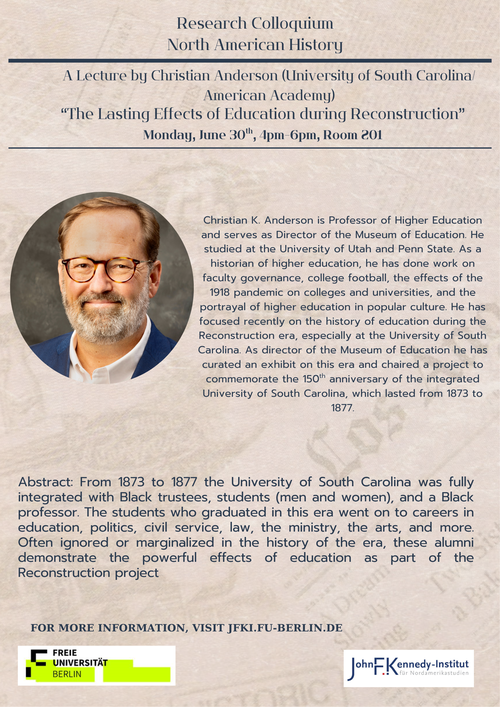Research Colloquium: Lecture by Christian Anderson: "The Lasting Effects of Education during Reconstruction"
Christian K. Anderson is a Professor of Higher Education and serves as Director of the Museum of Education. He studied at the University of Utah and Penn State. As a historian of higher education, he has done work on faculty governance, college football, the effects of the 1918 pandemic on colleges and universities, and the portrayal of higher education in popular culture. He has focused recently on the history of education during the Reconstruction era, especially at the University of South Carolina. As director of the Museum of Education he has curated an exhibit on this era and chaired a project to commemorate the 150th anniversary of the integrated University of South Carolina, which lasted from 1873 to 1877.
Abstract:
In the wake of the Civil War, the United States entered an era of Reconstruction to rebuild and reunify the nation. Congress passed legislation fundamental to this process, including the Reconstruction Amendments and the Reconstruction Acts, which gave conditions to rebel states for reentry to the Union, including that they write a new constitution. Along with the end of slavery, the introduction of voting and civil rights for Blacks, and the possibility of greater economic independence, Southern states introduced access to education
In South Carolina the new Constitution, adopted in March 1868, stipulated that the “General Assembly shall…provide for a liberal and uniform system of free public schools throughout the State” in newly formed school districts. It further stipulated that the state should “provide for the maintenance of the State University” and provide for “the establishment of an Agricultural College” as well as “educational institutions for the benefit of all the blind, deaf and dumb, and other benevolent institutions as the public good may require.”
One of the most dramatic educational transformations in the South took place on the campus of the University of South Carolina. In 1869 the legislature elected two Black trustees, in 1873 the first Black student enrolled and the first Black professor was appointed, and in 1874 a normal school for training new teachers opened with most Black women as students. The University, guided by the principles of the new constitution that access to education should be “free and equal” and “without regard to race or color,” was soon majority-Black, like the state’s population.
The election of 1876 was the death knell for Reconstruction nationally and for South Carolina and her university. By June 1877 the University was closed and all its faculty and students expelled. The legacy of the Reconstruction-era University of South Carolina extended far and wide, even though not fully appreciated or understood.

